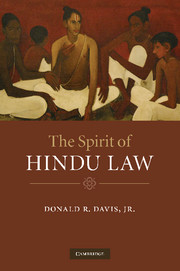Book contents
- Frontmatter
- Contents
- List of tables
- Preface
- Acknowledgments
- List of abbreviations
- Introduction (dharmaśāstra)
- 1 Sources and theologies (pramāṇa)
- 2 Hermeneutics and ethics (mīmāṃsā)
- 3 Debt and meaning (ṛṇa)
- 4 Persons and things (svatva)
- 5 Doubts and disputes (vyavahāra)
- 6 Rectitude and rehabilitation (daṇḍa)
- 7 Law and practice (ācāra)
- Conclusion
- Bibliography
- Index
7 - Law and practice (ācāra)
Published online by Cambridge University Press: 26 February 2010
- Frontmatter
- Contents
- List of tables
- Preface
- Acknowledgments
- List of abbreviations
- Introduction (dharmaśāstra)
- 1 Sources and theologies (pramāṇa)
- 2 Hermeneutics and ethics (mīmāṃsā)
- 3 Debt and meaning (ṛṇa)
- 4 Persons and things (svatva)
- 5 Doubts and disputes (vyavahāra)
- 6 Rectitude and rehabilitation (daṇḍa)
- 7 Law and practice (ācāra)
- Conclusion
- Bibliography
- Index
Summary
In a study such as this, the chapter on practice and history inevitably does the work of an apology. Some readers will have been bothered by the cavalier treatment of historical context evinced in this work thus far. In fact, perhaps the most important trend in recent academia has been the near universal insistence to “always historicize.” Nevertheless, the boundaries of what constitutes history are sometimes drawn too narrowly, especially when it comes to India. I am convinced that studies attempting to reveal presuppositions of thought, practices of interpretation, and scholarly generalizations about real-world affairs are necessary and important for historical work. Indeed, they form part of history itself.
In the first chapter of this survey, we examined the authoritative sources of law as expressed in the Hindu law texts. In this final chapter, I return to the question of law's authority, this time in the context of legal practice and customary law. In other words, I want to investigate both the conjunctions and disjunctions of how legal authority is represented and implemented between the Dharmaśāstra tradition and other historical sources. The concept of ācāra is both the conceptual and practical link between scholastic norms, ideas, and presuppositions and the rules and institutions of law in practice. It is important in this context because the relative dearth, indeed the striking rarity, of historical references to the Veda and Dharmaśāstra in legal contexts outside Sanskrit texts puts the signal importance of ācāra into relief.
- Type
- Chapter
- Information
- The Spirit of Hindu Law , pp. 144 - 165Publisher: Cambridge University PressPrint publication year: 2010



